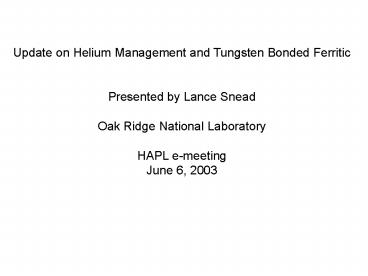Update on Helium Management and Tungsten Bonded Ferritic - PowerPoint PPT Presentation
1 / 7
Title:
Update on Helium Management and Tungsten Bonded Ferritic
Description:
Update on Helium Management and Tungsten Bonded Ferritic. Presented ... Metallography has been carried out. X-ray diffraction and ... Metallography has ... – PowerPoint PPT presentation
Number of Views:27
Avg rating:3.0/5.0
Title: Update on Helium Management and Tungsten Bonded Ferritic
1
Update on Helium Management and Tungsten Bonded
Ferritic Presented by Lance Snead Oak Ridge
National Laboratory HAPL e-meeting June 6, 2003
2
Helium Management - Strategy Review
this year
next year
Understand Trapping and Diffusion
Effects of Thermal Cycling
Modeling Structure
Testing Engineered Structure
function of
function of
Single X CVD X Powder Met
Initial Dose Temperature
Material
Temperature
Concentration
3
Helium Management - Results Update
Previous Result
Repeat of Experiment
CVD produced 238 counts Polycrystalline produced
82 counts Single crystal produced no counts
CVD produced 480 counts Polycrystalline produced
355 counts Single crystal produced 303 counts
4
Helium Management - Results Update
- The error in the original data was confirmed
by a third test. While there is a dependence of
microstructure on retained helium is not
dramatic. - Work to be completed this year
- - Implantation system to be automated for
- continual irradiation/anneal, simulating IFE
- implantation dose, temperature and thermal
- spike.
- Samples of CVD W, powder met W, and single
crystal tungsten were implanted at 1013, 1014,
and 1015 /cm2 at room temperature and shipped to
DELFT for thermal desorption studies (underway.) - Elevated dose/annealing and TEM microstructural
analysis continues. - Trapping sites and diffusion coefficients by
end of year for modeling..
5
First Wall Armor - Strategy Review
this year
next year(s)
FW Paper
Process Armor Systems Model Interface Stress
Determine Thermal Stability of Interface
Evaluate Properties
Prototype
W on SiC (complete)
underway
Monolithic W on LAF
Plasma Spray Transient Melt (IR melt) Diffusion
Bonded
Engineered W on LAF
Tungsten Foams Functionally Graded
6
First Wall Armor - Plasma Spray
The potential for failure of a tungsten
cladding on F82H steel is driven by strain
mismatch at the coating interface. This strain
mismatch arises from the cladding process as well
as nominal and transient operating conditions.
The CTE of F82H Steel at 600C is 11 ppm/K
compared to 4.7 ppm/K for tungsten. In addition,
the alpha and gamma iron phase transformations
must be considered for F82H Steel at temperatures
associated with cladding. Plasma spraying
under inert gas and vacuum allow for the
deposition of pure tungsten and tungsten/steel
composite microstructures. Graded layers can
mitigate concentrated strain mismatches.
Plasma spraying of preheated substrates can be
used to manage the magnitude and direction of
interfacial stress. --gt Samples have been
sprayed at various substrate temperatures.
--gt Metallography has been carried out. X-ray
diffraction and annealing pending. Transient
powder melt may allow porosity near surface.
--gt Samples have been sprayed at various
substrate temperatures. --gt Metallography
has been carried out. Diffusion bonding of
tungsten foil as the top layer would result in
the highest surface integrity if strain mismatch
could be managed by plasma sprayed, composite
inter-layers.
7
Examples of Two Techniques
Plasma Sprayed W on F83H LAF 600C Substrate
Temperature
Transient Powder Melt W on F83H LAF
Ambient Substrate Temperature
100 microns
cleaner interface martensite
formation(brittle)
phase separation at interface































